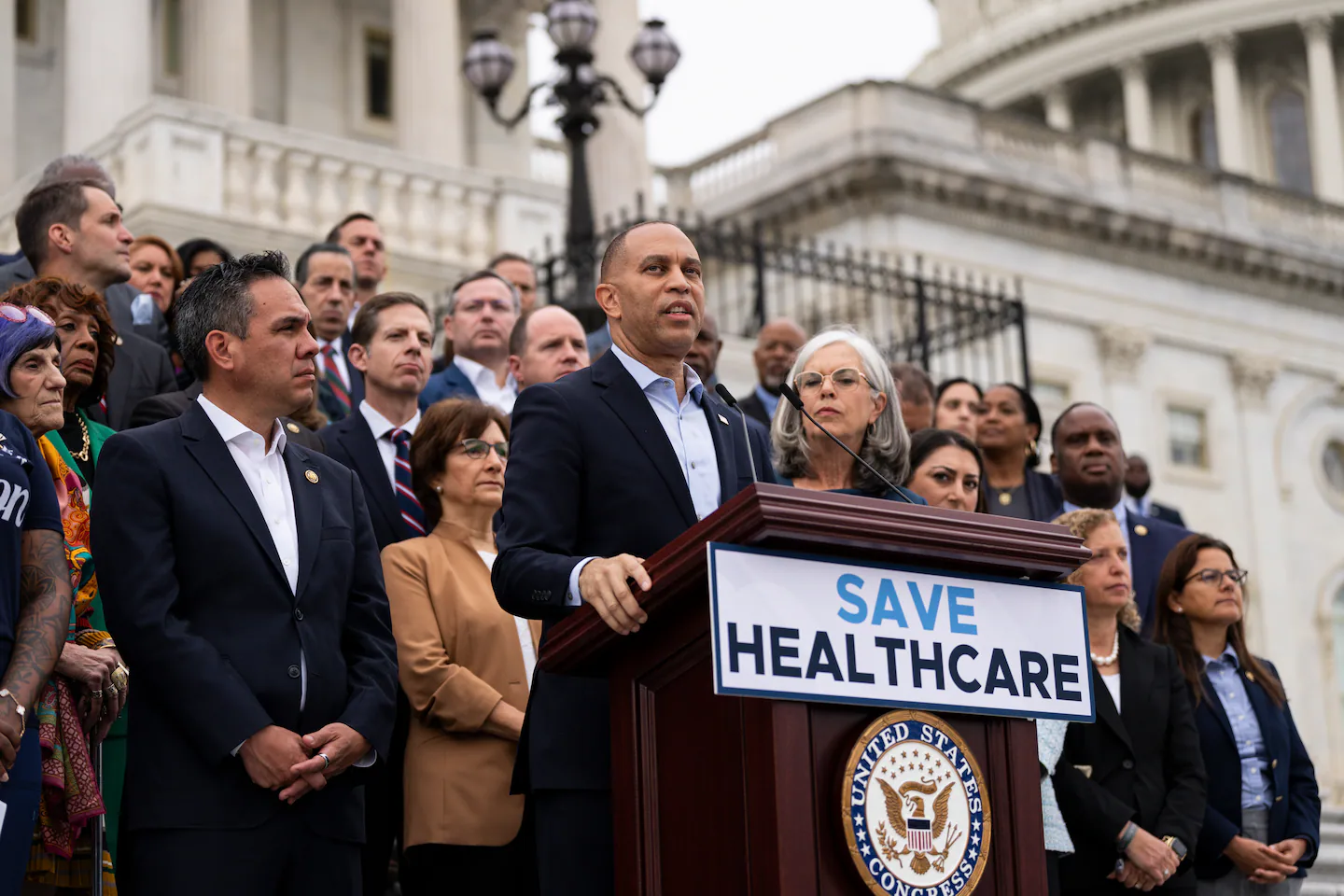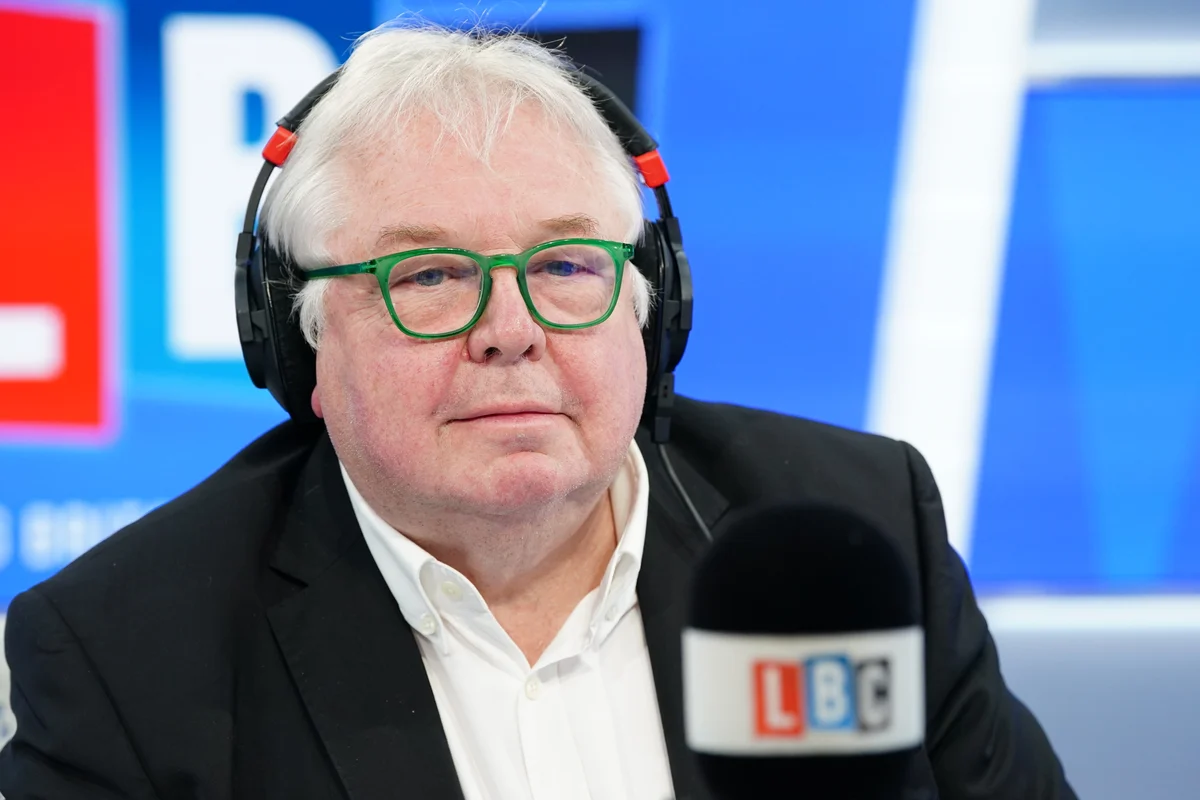
Still struggling to find their footing a year after Trump’s election victory, Democrats are convinced they can re-create the type of backlash over GOP health care plans that proved to be so politically potent in his first term.
“It’s a no-brainer, in my opinion,” said Brad Woodhouse, a longtime Democratic operative who is the president of Protect Our Care, an outside group that has sought to counter the GOP’s health care platform.
“If [Democrats] wanted to use their leverage to highlight an issue, put a stake in the ground, and get Republicans to fix some of this,” he added, “health care was the issue to pick.”
In the past week, Democratic leaders have sounded a great deal like they did eight years ago — though maybe more confident and, perhaps, less subtle.
“We’re here to protect your health care today,” said House minority leader Hakeem Jeffries on the steps of the Capitol on Tuesday, flanked by dozens of lawmakers. Jeffries went on to use that phrase eight more times in the next eight sentences.
Later Tuesday, hours before the deadline, former House speaker Nancy Pelosi — who passed the ACA in the House and then fought its repeal — spoke at a rally outside the Capitol, where she argued the lessons of that moment were clear.
“We won that election in 2018; we won 40 seats,” Pelosi said. “And you know what our message was? Protect our care.”
Indeed, regardless of how the shutdown fight ultimately ends, Democrats see their current strategy pointing toward a broader goal: keeping health care front and center in the battle for control of Congress next year.
“This debate reopens the door for the health care conversation going into the midterms in a way that most Republicans would have preferred to keep it closed,” said Jesse Ferguson, a veteran Democratic operative who has advised several outside groups active in the health care fight.
“The biggest difference between 2018 and now is, in 2018, we were litigating the threat that Republicans posed to health care,” Ferguson added. “In 2026, we’re litigating the consequences of what they did to health care.”
Outside Democratic-aligned groups have launched campaign-style ads to ratchet up the pressure on GOP lawmakers in vulnerable districts. A spot this week from the group Unrig Our Economy, running on TV in 14 GOP-held House districts, charged that congressional Republicans were set on “ending tax credits for health care and raising your insurance premiums.”
Democrats believe the electorate is still overwhelmingly on their side on health care policy; public opinion polls consistently show broad support for the programs they are defending.
Representative Richard Neal, a Springfield Democrat and one of the legislative architects of the ACA, said its growing popularity is evident by the fact that Republicans have stopped trying to repeal it after failing to do so in Trump’s first term. He said it makes sense for Democrats to lean into protecting the ACA subsidies during this government funding fight.
“Taking a benefit away is a hard thing to do after people have come to accept it,” Neal said.
But sharply partisan shutdown politics could change that dynamic by muddying the waters of public opinion. While recent shutdowns have been fought over an array of issues — such as the historic 35-day 2018-2019 government closure over Trump’s border wall — it’s been unclear whether they had any significant long-term impacts.
A New York Times/Siena poll released Tuesday showed 65 percent of respondents believe Democrats should not shut down the government if their demands were not met. Notably, only 47 percent of Democrats polled agreed with party leaders, while 43 percent of them opposed a shutdown.
For Democratic lawmakers, who are facing tremendous pressure from the progressive base to resist GOP spending plans, there’s also the risk that they will fail to secure many of their requested concessions.
Realistically, any theoretical spending deal would be far narrower in scope than what Democrats are currently demanding. The ACA premium tax credits are seen as the most ripe for negotiation, given that some moderate Republican lawmakers could be wary of letting them expire. If they do, insurance premiums for plans purchased on the ACA market could spike as much as 114 percent, according to the health policy analysis outlet KFF and likely cause many to forgo insurance.
But some Democrats are also demanding rollbacks of parts of Republicans’ just-enacted One Big Beautiful Bill, which made changes to Medicaid and the ACA that are projected to eventually kick 10 million people off their health insurance, according to the Congressional Budget Office. Republicans are highly unlikely to agree to undoing any part of their marquee legislation, which they narrowly managed to pass in July.
Trump and the GOP have sought to turn the issue around on Democrats in this shutdown fight. For instance, GOP leaders have emphasized the potential broader damage of letting government funding lapse — including for health care programs that serve military veterans.
Senate majority leader John Thune, of South Dakota, has signaled willingness to negotiate with Democrats over the ACA subsidies but has insisted those discussions happen outside the context of funding the government.
Other Republicans as well as officials in the Trump administration have claimed Democrats are aiming to secure health care funding for undocumented immigrants, alleging that ACA subsidy programs can be abused to allow them to access the benefits. Democrats have hotly disputed the claims, noting that existing laws stipulate adult undocumented immigrants are not eligible for those programs.
In response to the health care-focused shutdown ads run against vulnerable Republicans, Mike Marinella, spokesperson for the National Republican Congressional Committee, told the Globe, “Out of touch House Democrats voted to shut down the government to bankroll handouts for illegal immigrants and appease their radical base. Voters won’t forget who betrayed them, and Democrats will pay the price.”
Not every Democrat is on board with the strategy. Representative Jared Golden, the Maine moderate who was the only member of his party to approve the GOP’s spending plan in the House, wrote in his newsletter last week that a shutdown “to gain political leverage doesn’t make a win on health care any more certain, and it guarantees real harm to many of the same people we’re trying to help.”
But Representative Don Beyer, a Democrat from Virginia, argued that if his party was intent on maximizing leverage and political pain, they might go about this shutdown fight differently — by letting the ACA subsidies expire.
“The cynic would say, you know, let this continue to happen, because that gives us the next election. … What a powerful issue to run on,” he said. “But we’re basically trying to take away the strongest thing we could run on next year, because it’s the responsible thing to do.”
Jim Puzzanghera of the Globe staff contributed to this report.



